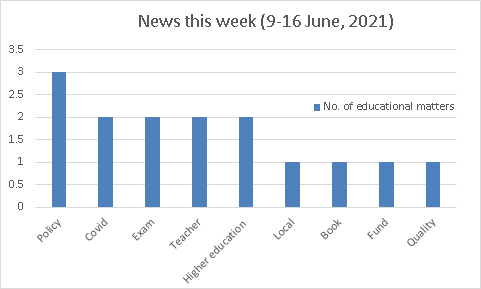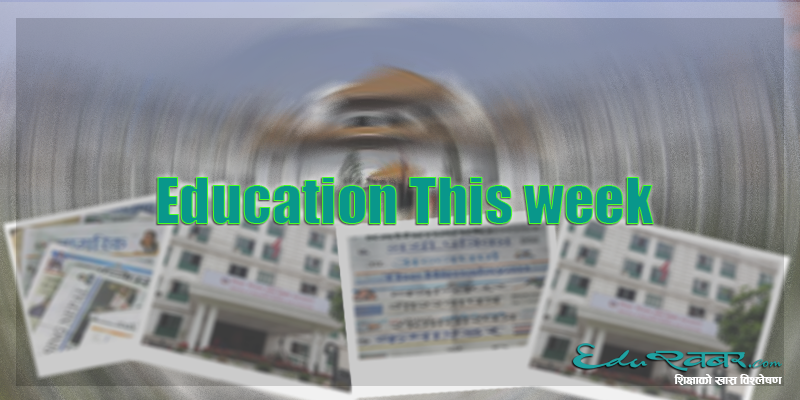Kathmandu - This week, the news focused on the National Examination Board calling all schools to submit the evaluation sheet of Grade X students on the front page of the media. The burden of salary increases in local municipalities, five lakh loan to higher education by Kamalamai Municipality and the World Bank approval of $60 million to strengthen Nepal’s higher education were the issues covered in the media throughout the week.

- News stated that the National Examination Board has asked all schools in the country to submit the evaluation sheet of Grade X students to the respective District Education Development and Coordination Unit by July 4 on the basis of evaluation of students’ performance. The evaluation of students’ performance will be made by a five-member committee of the school comprising the head teacher, one senior teacher and teachers of English, Mathematics and Science. The committee shall fill the form provided by the NEB in accordance with the proper evaluation scheme. The schools are expected to provide proper explanation regarding the marks provided to the students, especially when the marks in theory subjects is above 80 per cent, stated the news.
- A letter to the editor suggested that to begin a new academic session from June 15, the government should prioritize vaccinating all students before the start of the session. The schools can run on alternate days for male and female students to keep the numbers low for the WHO mandated hand-washing and social distancing ease, mentioned in the letter.
- News stated that the government's budget statement to increase the salaries of community school ECD teachers and staff has added financial burden to the local government. The Manthali municipality has formulated a budget of Rs 14.8 million for the improvement of education activities and physical infrastructure in the current fiscal year. Even if other plans and activities in the education sector are not added, the municipality will have to raise an additional Rs 16 million for the salary alone for the coming year. While allocating money for salary, other development works of the city will be affected, stated the news.
- News stated that the World Bank approves $60 million to strengthen Nepal’s higher education to improve the quality of Nepal’s higher education, scale up online learning, and expand access to academic institutions for underprivileged and vulnerable students. World Bank country director for Nepal, Maldives and Sri Lanka was quoted stating that the programme will expand targeted scholarships to help disadvantaged students pursue labour market-driven academic programmes and support equity grants to higher education institutions in needy and disaster-affected areas in Nepal.
- Another news article stated that Kamalamai Municipality-5 has started giving unconditional interest free loans for higher education studies by keeping educational certificates. The municipality has adopted a policy of providing unconditional interest-free loans on the basis of educational certificates to poor, hardworking and honest students of the municipality to ensure that the parents can pay the installments, stated the news.
These kinds of innovation at the local level could not be imagined had the school system remained as the responsibility of the federal government. Such regular news of innovative approaches taken by local governments indicates that the municipalities have very well accepted the improvement and access to education as their priority and hope this will increase as we move ahead through new tenures of local government in federal Nepal.
- An editorial article expressed the need to strictly carry out the directive of the Ministry of Education, Science and Technology to seize all school textbooks failing to incorporate the new map of Nepal. It stated that publishers revise the maps on textbooks, especially those related to Social Studies and general knowledge. It called on penalties for schools suggesting text books without this correction and appealed to the parents to also be aware of the issue. It also called for a separate government entity to take the responsibility of reviewing textbooks before permitting them to be published or for publishing a single set of textbooks in both Nepali and English for all the schools.
- An opinion article titled ‘Improving learning outcomes, Teachers’ commitment is crucial’ discussed the accepted understanding that the impact of teacher training seldom reaches to influence classroom practices. It shared a successful student-centric teaching practice in Kailali where a girl’s club organized extra classes other than regular schools, where students take active participation in decision making on what happens in those classes and how they are executed. Regular facilitation was provided to the teachers to take the role of a facilitator with innovative approach to class activities and self-evaluation methods for students. The article further explains the impact of regular follow-up monitoring visits and sharing between teachers which lack in the regular teacher training programs run by the government.
The lessons shared in the article signifies the need for such experimental exercises by municipalities that can help identify and build innovative practices in schools to motivate teachers and encourage students to actively participate in school and learning activities beyond curriculum and textbooks. These experiments can also encourage self-learning among teachers and students equally.
'Education this Week' is a joint effort to analyze the press coverage of education in Nepal’s selected print media published in Kathmandu. The main aim of this effort is to identify and explain major education issues picked up by the media and give back and foreground the news. This, we believe, will help policy makers and other responsible people to keep abreast with ongoing concerns and discussions on and around education. EduKhabar, in collaboration with the Center for Educational Policies and Practices (CEPP), has produced this analysis based on the news printed in Kantipur (Nepali) and The Himalayan Times (English) between 9-16 June 2021 (26, Jestha-1 Asar, 2078) - Editor.

 - News stated that the National Examination Board has asked all schools in the country to submit the evaluation sheet of Grade X students to the respective District Education Development and Coordination Unit by July 4 on the basis of evaluation of students’ performance. The evaluation of students’ performance will be made by a five-member committee of the school comprising the head teacher, one senior teacher and teachers of English, Mathematics and Science. The committee shall fill the form provided by the NEB in accordance with the proper evaluation scheme. The schools are expected to provide proper explanation regarding the marks provided to the students, especially when the marks in theory subjects is above 80 per cent, stated the news.
- News stated that the National Examination Board has asked all schools in the country to submit the evaluation sheet of Grade X students to the respective District Education Development and Coordination Unit by July 4 on the basis of evaluation of students’ performance. The evaluation of students’ performance will be made by a five-member committee of the school comprising the head teacher, one senior teacher and teachers of English, Mathematics and Science. The committee shall fill the form provided by the NEB in accordance with the proper evaluation scheme. The schools are expected to provide proper explanation regarding the marks provided to the students, especially when the marks in theory subjects is above 80 per cent, stated the news.
प्रतिक्रिया